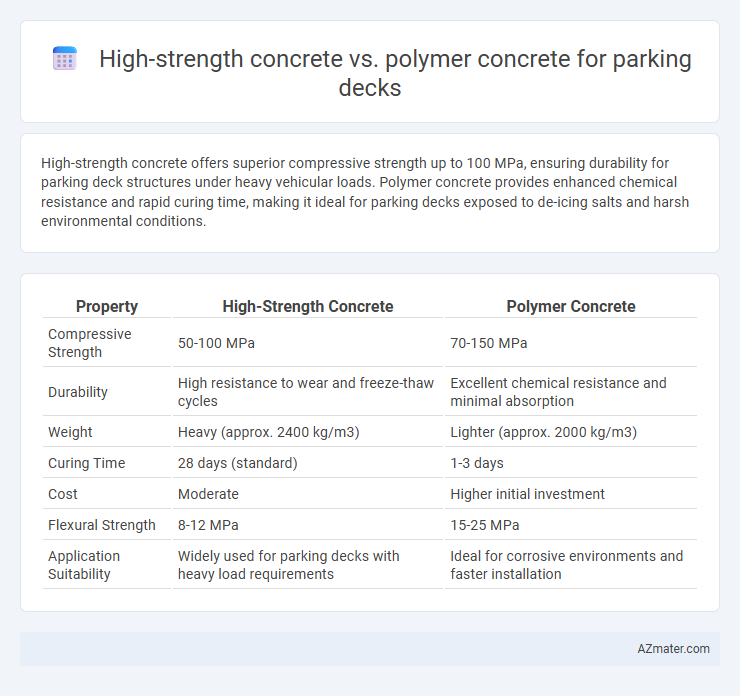High-strength concrete offers superior compressive strength up to 100 MPa, ensuring durability for parking deck structures under heavy vehicular loads. Polymer concrete provides enhanced chemical resistance and rapid curing time, making it ideal for parking decks exposed to de-icing salts and harsh environmental conditions.
Table of Comparison
| Property | High-Strength Concrete | Polymer Concrete |
|---|---|---|
| Compressive Strength | 50-100 MPa | 70-150 MPa |
| Durability | High resistance to wear and freeze-thaw cycles | Excellent chemical resistance and minimal absorption |
| Weight | Heavy (approx. 2400 kg/m3) | Lighter (approx. 2000 kg/m3) |
| Curing Time | 28 days (standard) | 1-3 days |
| Cost | Moderate | Higher initial investment |
| Flexural Strength | 8-12 MPa | 15-25 MPa |
| Application Suitability | Widely used for parking decks with heavy load requirements | Ideal for corrosive environments and faster installation |
Introduction to Parking Deck Materials
Parking deck construction demands materials with high durability, load capacity, and resistance to environmental stressors. High-strength concrete offers superior compressive strength and excellent long-term performance, making it suitable for heavy traffic and dynamic loads. Polymer concrete provides enhanced chemical resistance and rapid curing times, beneficial for environments exposed to de-icing salts and aggressive chemicals.
Overview of High-Strength Concrete
High-strength concrete (HSC) is characterized by its compressive strength typically above 6,000 psi, offering superior load-bearing capacity and durability for parking decks exposed to heavy traffic and harsh environmental conditions. It enhances structural performance by reducing member size and increasing lifespan through improved resistance to abrasion, freeze-thaw cycles, and chemical attacks from deicing salts. High-strength concrete's dense microstructure and optimized mix design contribute to its enhanced mechanical properties and long-term stability in parking deck applications.
Overview of Polymer Concrete
Polymer concrete consists of a resin binder combined with aggregates, offering superior chemical resistance and excellent durability in harsh environmental conditions compared to traditional high-strength concrete. Its rapid curing time and low permeability make it ideal for parking deck applications exposed to de-icing salts and heavy traffic loads. Despite higher material costs, polymer concrete's enhanced mechanical properties and resistance to corrosion reduce long-term maintenance expenses and increase structural lifespan.
Material Properties Comparison
High-strength concrete offers superior compressive strength typically ranging from 6,000 to 15,000 psi, making it highly resilient against heavy vehicular loads commonly encountered in parking decks. Polymer concrete, composed of resin binders and aggregates, provides enhanced chemical resistance and lower permeability, significantly reducing water absorption and chloride ion penetration, crucial for durability in environments exposed to deicing salts. While polymer concrete exhibits faster curing times and improved flexibility, high-strength concrete maintains better cost-efficiency and compatibility with traditional reinforcement methods, essential for large-scale parking deck construction.
Durability and Longevity
High-strength concrete offers exceptional compressive strength and durability, making it ideal for parking decks subjected to heavy loads and varying weather conditions. Polymer concrete excels in resistance to chemical attacks, abrasion, and freeze-thaw cycles, enhancing the longevity of parking structures exposed to deicing salts and petroleum-based contaminants. Choosing between the two depends on specific environmental challenges and maintenance requirements to maximize the parking deck's lifespan.
Resistance to Chemicals and Abrasion
High-strength concrete offers excellent compressive strength but is more susceptible to chemical attacks and abrasion-related deterioration compared to polymer concrete, which incorporates resins that enhance chemical resistance and surface durability. Polymer concrete demonstrates superior performance against de-icing salts, oils, and various aggressive chemicals commonly found in parking decks, reducing maintenance costs and extending service life. Its abrasion resistance significantly surpasses that of traditional high-strength concrete, providing a durable solution for high-traffic areas and harsh environmental conditions.
Installation Process and Curing Times
High-strength concrete for parking decks requires a typical curing period of 7 to 28 days, often involving water curing or curing compounds to achieve optimal compressive strength above 6000 psi. Polymer concrete offers faster installation with curing times as short as 24 to 48 hours due to its thermosetting resin matrix, reducing downtime and accelerating project completion. The installation of polymer concrete involves precise mixing and application techniques to ensure proper polymerization and adhesion, contrasting with the more traditional placement and finishing methods used for high-strength concrete.
Maintenance Requirements
High-strength concrete exhibits greater durability with minimal maintenance, resisting wear and environmental stress effectively, which reduces long-term repair costs in parking decks. Polymer concrete offers superior chemical resistance and rapid curing, minimizing downtime during maintenance and preserving surface integrity against de-icing salts and oil spills. Both materials enhance longevity, but polymer concrete's maintenance advantage lies in its resilience to aggressive chemicals, while high-strength concrete emphasizes structural robustness.
Cost Analysis and Lifecycle Assessment
High-strength concrete offers lower initial material costs due to widespread availability and simpler production processes compared to polymer concrete, which has higher raw material expenses driven by resin and curing agents. Lifecycle assessment reveals polymer concrete's superior durability and resistance to chemical and weathering impacts, reducing maintenance and repair costs over time, which can offset its upfront premium in high-traffic parking decks. Evaluating total cost of ownership, polymer concrete may provide better long-term value in harsh environments despite higher initial investment, while high-strength concrete suits budget-sensitive projects with standard exposure conditions.
Best Applications for Each Material
High-strength concrete excels in parking decks requiring exceptional load-bearing capacity and durability under heavy vehicle traffic, making it ideal for structural components like slabs and beams. Polymer concrete offers superior chemical resistance and rapid curing times, making it well-suited for areas exposed to deicing salts, fuel spills, and quick repair needs. Each material's unique properties determine its best application, with high-strength concrete favored for foundational support and polymer concrete preferred for protective overlays and maintenance.

Infographic: High-strength concrete vs Polymer concrete for Parking deck
 azmater.com
azmater.com